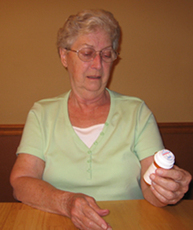Around one in five young people in the U.S. have a current mental, emotional, or behavioral disorder. About half of all adults with mental disorders recalled that their disorders began by their mid-teens and three-quarters by their mid-20s. Early onset of mental health problems have been associated with poor outcomes such as failure to complete high school, increased risk for psychiatric and substance problems, and teen pregnancy. A new article by Mary E. Evans, RN, PhD, FAAN, published in the Journal of Child and Adolescent Psychiatric Nursing assesses the recently released government report on preventing these disorders among young people. Dr. Evans’ paper concludes that using certain interventional programs in schools, communities and health care settings, risk for mental illness can be better identified and treated.
July 2009
Yesterday I posted a link to the New York Times article on the controversy surrounding the internet publication of the Rorschach Ink Blots on Wikepedia.
One of the most well-known psychological tools is the Rorschach Inkblot Test. However, does the inkblot really reveal all? According to the current report, despite its popularity, the Rorschach may not be the best diagnostic tool and practitioners need to be cautious in how they use this technique.
A viewer looks at ten inkblots, one at a time, and describes what they see. The rationale behind this test is the idea that certain aspects of the subject’s personality will be exposed as they are interpreting the images, allowing for the possible diagnosis of various psychological disorders. However, does the inkblot really reveal all? Psychological Science in the Public Interest, a journal of the Association for Psychological Science, published an exhaustive review of all data on the Rorschach (and other similar “projective” tests) in 2000. Such meta-analyses are major undertakings, so although this report is a few years old, it remains the most definitive word on the Rorschach. [continue reading…]

Remembering to take daily medications can be a challenge, but new research offers tips for strengthening those memories.
Doing something unusual, like knocking on wood or patting yourself on the head, while taking a daily dose of medicine may be an effective strategy to help seniors remember whether they’ve already taken their daily medications, suggests new research from Washington University in St. Louis. [continue reading…]
New York Times: Today Noam Cohen asks is Wikepedia jeopardizing one of the oldest continuously used psychological assessment tests? The Rorschach test, a series of 10 inkblot plates created by the Swiss psychiatrist Hermann Rorschach for his book “Psychodiagnostik,” published in 1921, is clearly in the second category.The online encyclopedia Wikipedia has been engulfed in a furious debate involving psychologists who are angry that the 10 original Rorschach plates are reproduced online, along with common responses for each. For them, the Wikipedia page is the equivalent of posting an answer sheet to next year’s SAT. Link to continue reading
Source: New York Times

